2023届高考英语复习名词性从句讲解课件(49张ppt)
文档属性
| 名称 | 2023届高考英语复习名词性从句讲解课件(49张ppt) | 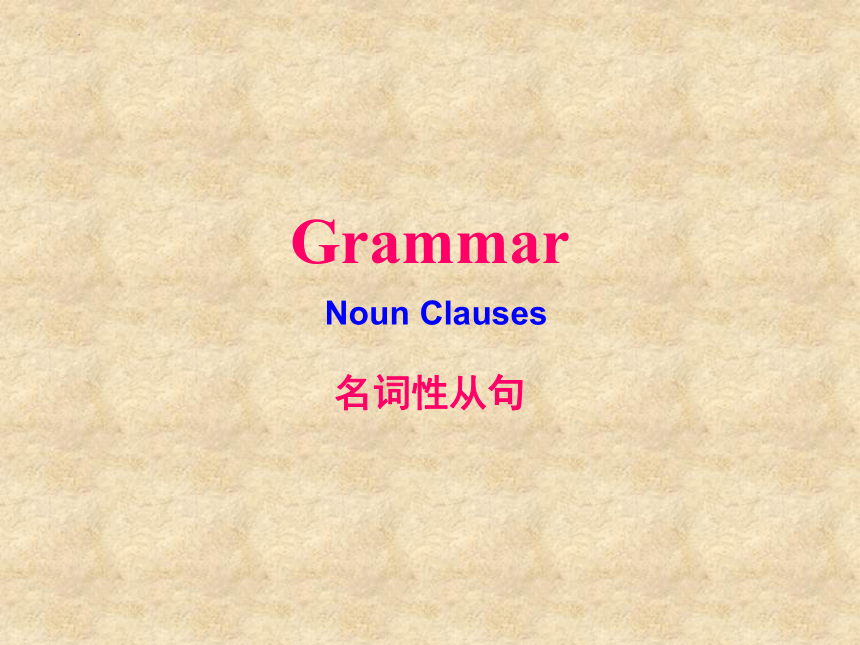 | |
| 格式 | pptx | ||
| 文件大小 | 345.1KB | ||
| 资源类型 | 教案 | ||
| 版本资源 | 通用版 | ||
| 科目 | 英语 | ||
| 更新时间 | 2022-11-02 22:17:27 | ||
图片预览

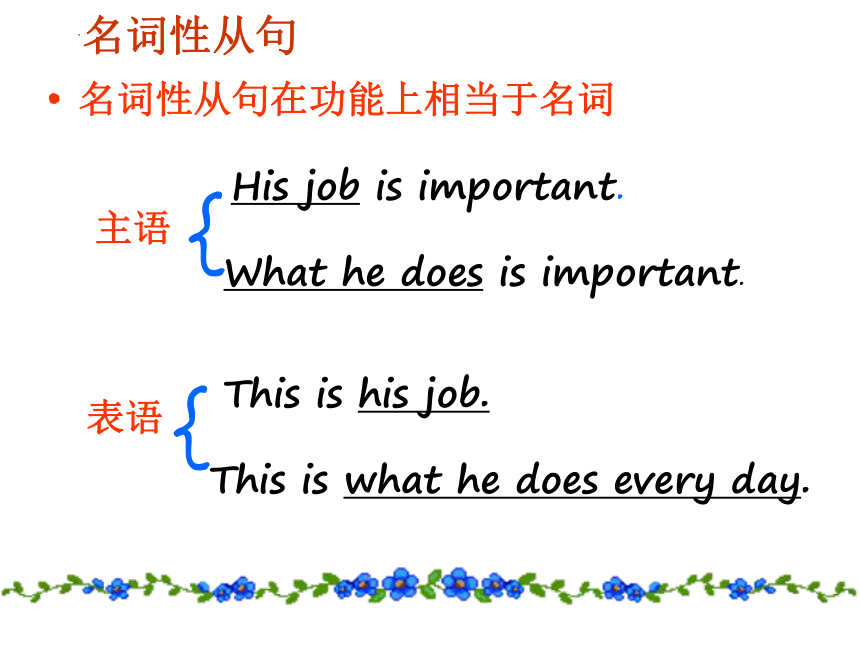
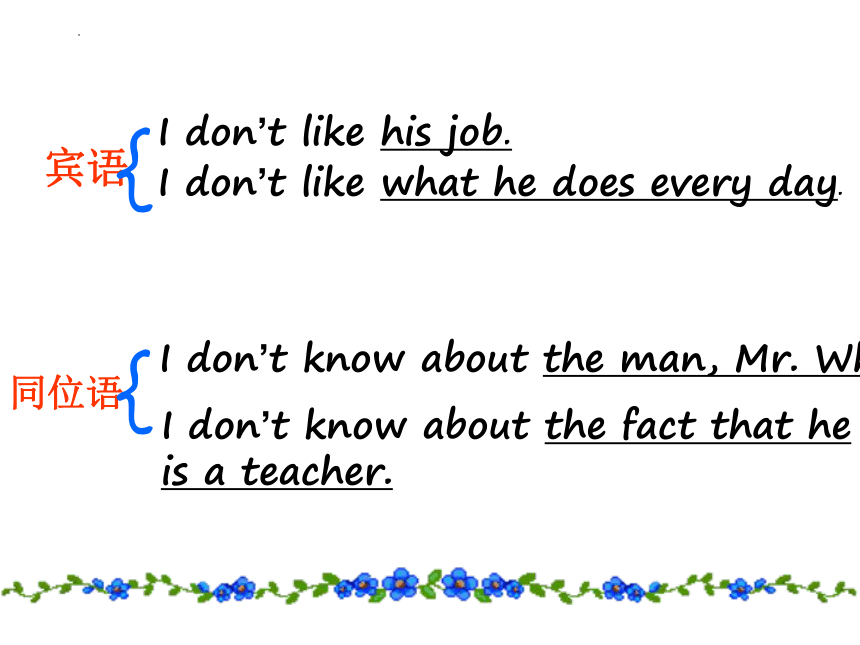
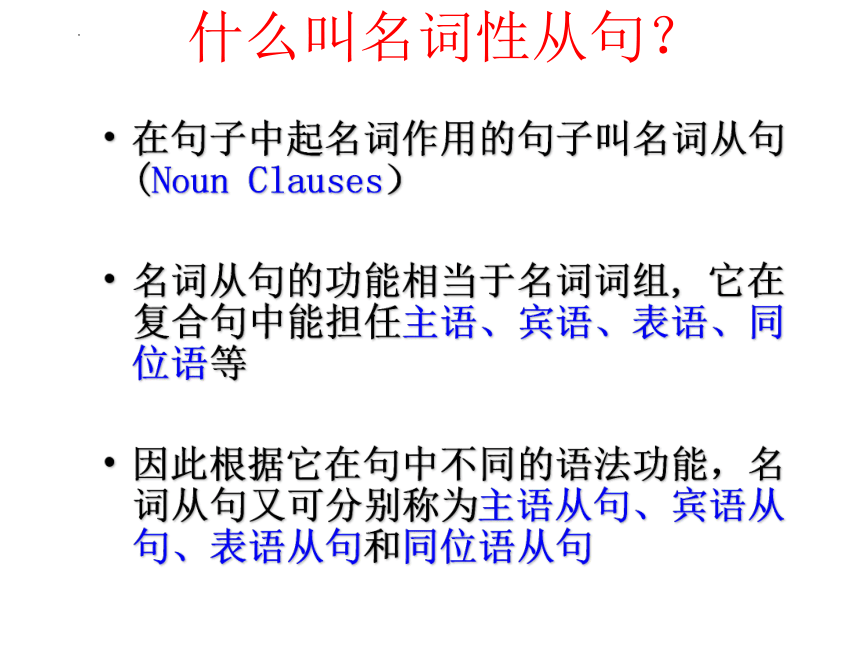
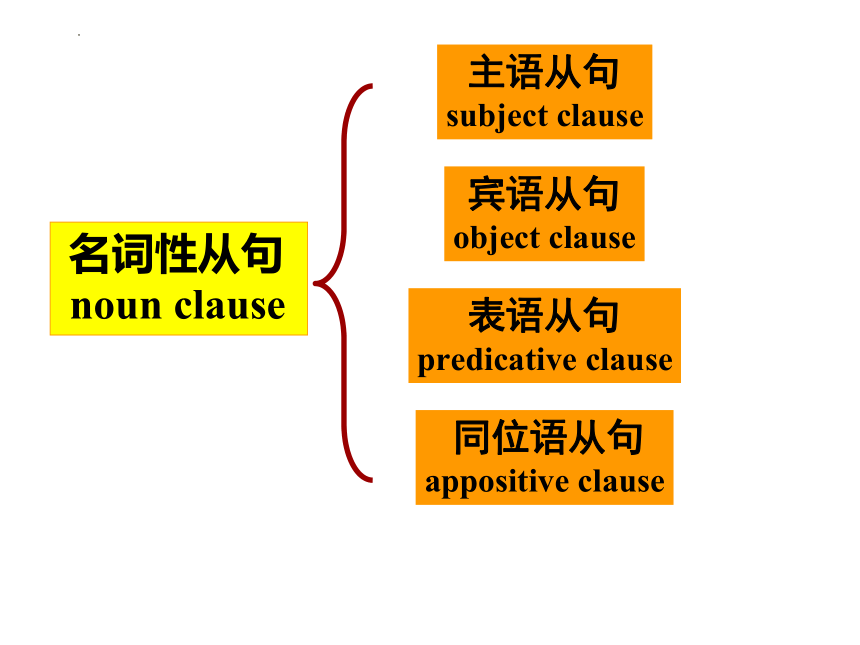
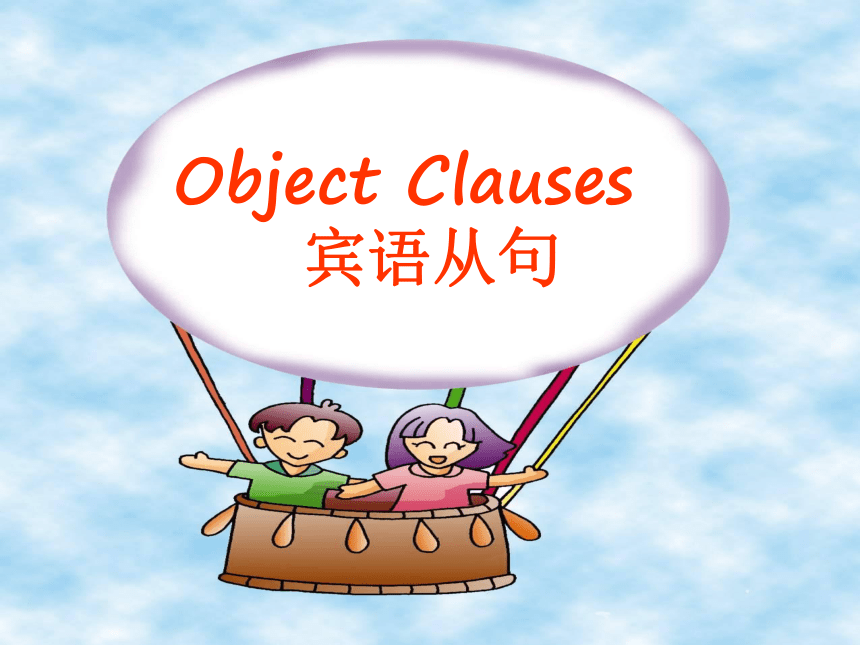
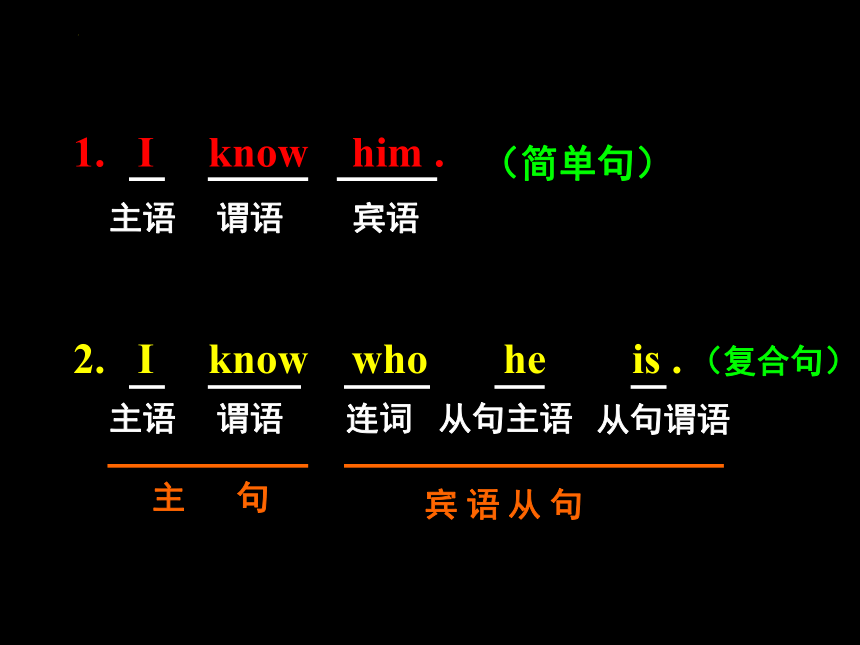
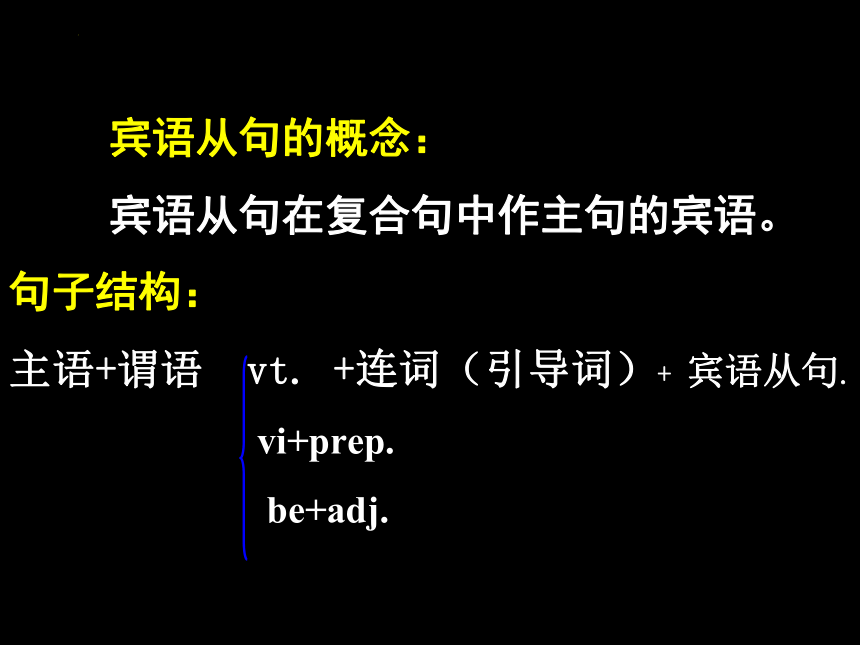
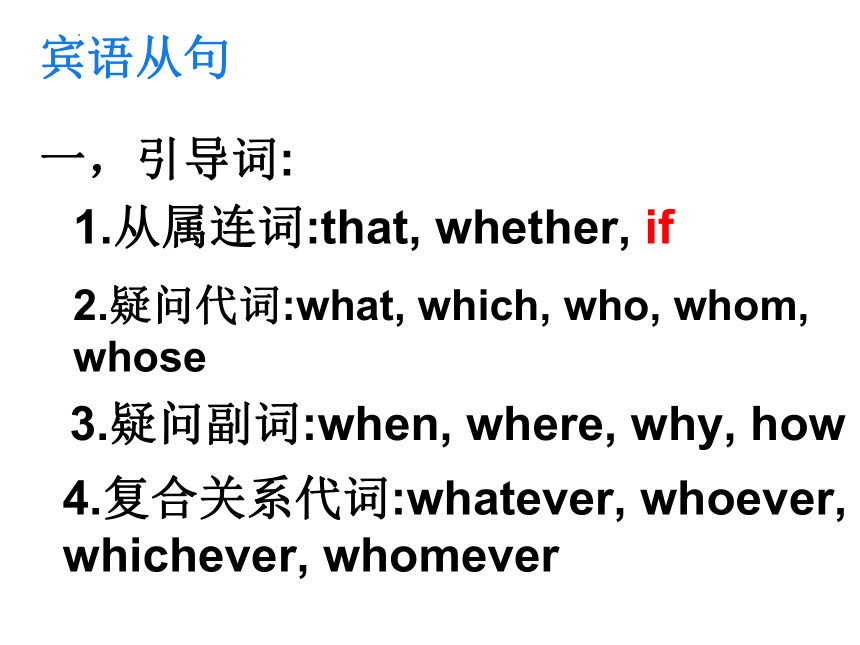
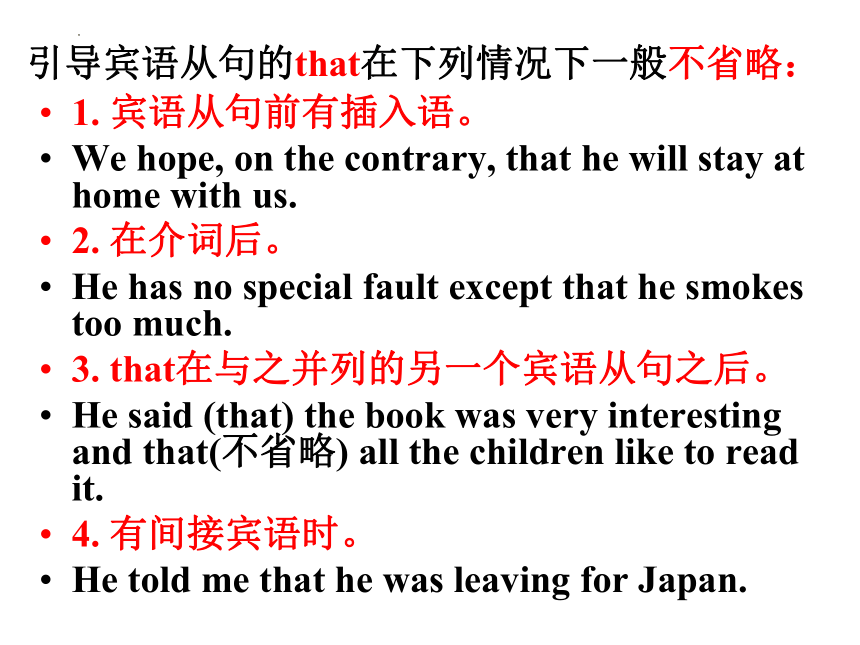
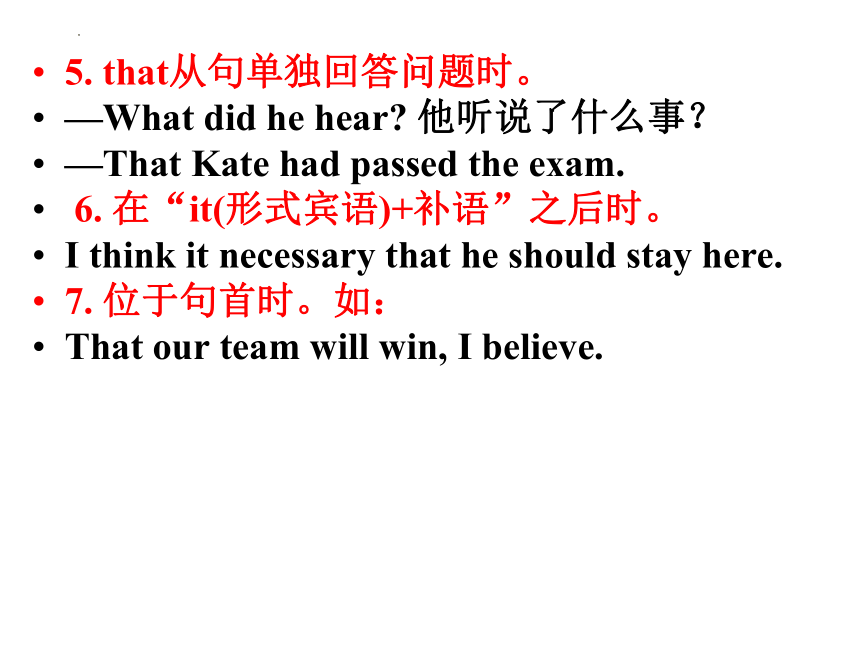
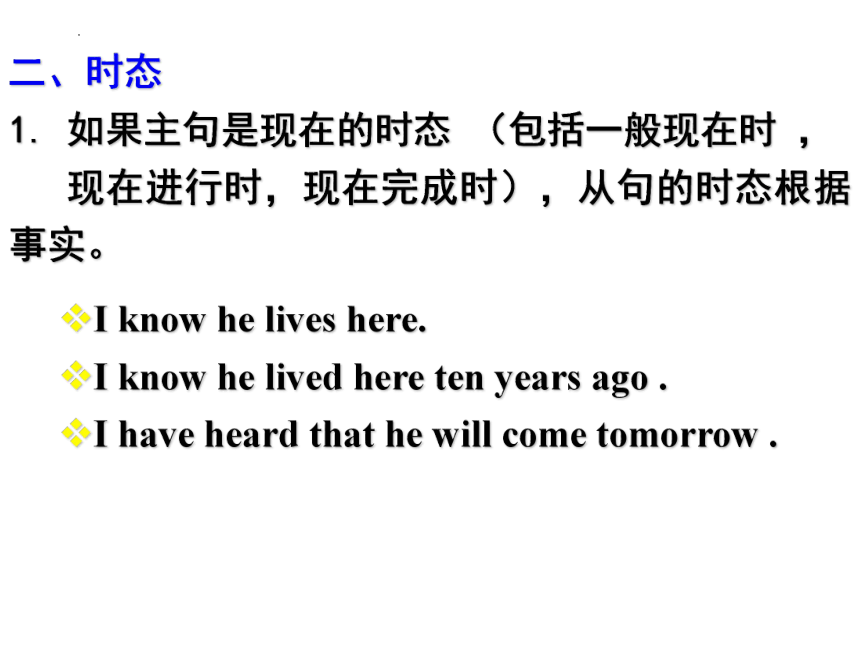
文档简介
(共49张PPT)
Grammar
Noun Clauses
名词性从句
名词性从句
名词性从句在功能上相当于名词
主语
{
His job is important.
What he does is important.
表语
This is his job.
This is what he does every day.
{
宾语
{
I don’t like his job.
I don’t like what he does every day.
同位语
{
I don’t know about the man, Mr. White.
I don’t know about the fact that he is a teacher.
什么叫名词性从句?
在句子中起名词作用的句子叫名词从句 (Noun Clauses)
名词从句的功能相当于名词词组, 它在复合句中能担任主语、宾语、表语、同位语等
因此根据它在句中不同的语法功能,名词从句又可分别称为主语从句、宾语从句、表语从句和同位语从句
名词性从句
noun clause
主语从句
subject clause
宾语从句
object clause
表语从句
predicative clause
同位语从句
appositive clause
Object Clauses
宾语从句
I know him .
2. I know who he is .
主语
谓语
宾语
(简单句)
主语
谓语
宾 语 从 句
连词
从句主语
从句谓语
主 句
(复合句)
宾语从句的概念:
宾语从句在复合句中作主句的宾语。
句子结构:
主语+谓语 vt. +连词(引导词)+ 宾语从句.
vi+prep.
be+adj.
一,引导词:
1.从属连词:that, whether, if
2.疑问代词:what, which, who, whom, whose
3.疑问副词:when, where, why, how
4.复合关系代词:whatever, whoever, whichever, whomever
宾语从句
引导宾语从句的that在下列情况下一般不省略:
1. 宾语从句前有插入语。
We hope, on the contrary, that he will stay at home with us.
2. 在介词后。
He has no special fault except that he smokes too much.
3. that在与之并列的另一个宾语从句之后。
He said (that) the book was very interesting and that(不省略) all the children like to read it.
4. 有间接宾语时。
He told me that he was leaving for Japan.
5. that从句单独回答问题时。
—What did he hear 他听说了什么事?
—That Kate had passed the exam.
6. 在“it(形式宾语)+补语”之后时。
I think it necessary that he should stay here.
7. 位于句首时。如:
That our team will win, I believe.
二、时态
1. 如果主句是现在的时态 (包括一般现在时 ,
现在进行时,现在完成时),从句的时态根据事实。
I know he lives here.
I know he lived here ten years ago .
I have heard that he will come tomorrow .
2.如果主句是过去的时态(包括一般过去时,过去进行时),那么从句的时态一定要用相对应的过去的某种时态(包括一般过去时,过去进行时,过去将来时, 过去完成时)
I knew who lived here.
I saw she was talking with her mother.
He asked whether his father would come back
tomorrow.
He said that he had seen it .
3.当从句是客观真理,定义,公理,定理
时用一般现在时。
The teacher said that the earth travels
around the sun .
My father told me that the sun rises from the east.
三、语序
宾语从句的语序用陈述语序:
连接词+主语+谓语+其他成分
1. When will he go to the library
a. His brother asks when he will go to the
library .
b. His brother asks when will he go to the
library .
2. What does he want to buy
a. I don’t know what he wants to buy .
b. I don’t know what does he want to buy .
√
√
3. 否定的转移:若主语谓语动词为think, consider, suppose, believe, expect,, imagine等,其后的宾语从句若含有否定意义,一般要把否定词转移到主句谓语上,从句谓语用肯定式。
(我认为这件衣服不适合你穿。)
I don’t think this dress fits you well.
上述部分主句谓语是think, believe, expect, suppose, imagine等引导的宾语从句,疑问部分与宾语从句相对应构成反意疑问句。
I don’t think he is bright,______
We believe she can do it better,__________
但此时主句主语必须是第一人称
如果不是则不能否定从句 ,如:
He thought they were wrong,_________
而不能说weren't they
is he
can’t she
didn't he
4. It 作为形式宾语而真正的宾语从句则放在句尾,
Like/love/hate/appreciate/help/look/depend on/see to/ count on/rely on + it + when/if/that clause
I hate it when people speak with their mouths full.
Sb.+ think/find/make + it +adj./n.+that clause
He made it clear that he would leave office soon.
我们的成功取决于我们互相之间合作得如何。
Our success depends on how well we can cooperate with one another.
没人敢确定一百万年以后地球是否存在
No one can be sure whether the earth will exist in a million years.
你可以做你喜欢做的任何事情
You may do whatever you like to do.
他建议他们明年去香港旅行。
He suggested that they should make a trip to Hong Kong next year.
Predicative Clauses
表语从句
表语从句是在复合句中作表语的名词性从句, 放在系动词之后,一般结构是“主语+系动词+表语从句”。可以接表语从句的系动词有be, look, remain, seem等。另外,常用的还有the reason why … is that … 和It is because …等结构。例如:
. 表语从句:从句在句中充当表语成分,一般放在系动词之后. 作用:对主语进行解释说明。
连接词:that / whether /as if /as though
连接代词:who / whom / whose / which / what
连接副词:when / where / why / how / because
注 意:
在表语从句中,表“是否” 时,只能用 “whether”不能用“If”。
一般情况下,“that”不能省。
It is /was because ….
It is /was why….
3. The reason (why…/for…)is /was that….
4 The reason is because /why…
that ….
他缺席的原因是因为他生病住院.
The reason for his absence was that he was ill in hospital.
问题是他们是否能帮我们克服困难.
The question is whether they will be able to help us out.
那就是我们应该首先做的事.
That is what we should do first.
这是因为你太认真的缘故.
it is because you are too serious.
他看起来好像快要哭起来了.
He looked as if he was going to cry.
Subject Clauses
主语从句
1. 主语从句:从句在句中充当主语成分
他会成功是肯定的。
1). That he will succeed is certain .
是否他去那儿还不知道。
2) Whether he will go there is not known .
他说的话不是真的。
3) What he said is not true .
无论谁来都是受欢迎的。
4) Whoever comes is welcome.
1.主语从句
引导词:
1.从属连词:that, whether
2.疑问代词:what, which, who, whom, whose
3.疑问副词:when, where, why, how
4.复合关系代词:whatever, whichever, whoever, whomever
考点一:主语从句后置!
为了避免主语冗长,句子头重脚轻,经常用it作形式主语,主语从句放在后面作真正的主语.例:
1.That we shall be late is certain.
-- It’s certain that we shall be late.
2. That the earth is round is known to all.
--
It’s known to all that the earth is round.
It 的用法: (形式主语)
It’s possible/important/necessary/clear/
obvious that…很可能/重要的是…/必要的是…/很清楚…
It’s said/ reported/believed that..据说/据报道…
It seems/appears/happens/occurs/matters/
that…显然、明显、 碰巧..
It’s no wonder that…并不奇怪/无疑…
It’s a pity/a fact /a common knowledge (众所周知)
/a surprise/ a question/ a shame/ high time…
【特别提醒】
连接代词what, whoever, whatever, whichever等引导的主语从句不宜用it作形式主语。
What is worth doing is worth doing well.
Whatever was said here has left us much to think.
考点二
注意:从句作主语 ,谓语动词一般用单数
What引导的主语从句,可根据表语决定
What he needs---- that book.
What he needs __ some books.
_is_
are
Appositive Clauses
同位语从句
同位语从句在句中充当同位语从句成分,其一般跟在一些抽象名词( idea ;belief ; fact ; truth ; problem ;news 等)后面,对名词作进一步解释说明. n.+ 连接词 + 从句
汤姆将出国的消息是他讲的。
The news that Tom would go abroad is told by him.
他是否胜利还有一些疑问
There is some doubt whether he will win
同位语从句常用 that 引导或用连接副词when / where/why / how / whether
注: 1. 同 位语从句多用that 引导
2. 在have no idea 之后常用wh-引导同位语从句.
I have no idea where he has gone.
I have no idea when he did it.
I have no idea what he did.
I have heard the news that he visited our factory .
I have heard the news that he told you the other day .
同位语从句和定语从句的区别:
1 同位语从句——that 只起连接作用,不作任何成分
定语从句 —— that 是关系代词,起连接作用和充 当宾语和主语
2同位语从句——同位语从句和前面的名词是同位关系,对名词进行补充说明
定语从句 ——定从和前面的名词是所属关系,对名词进行修饰,加以限定
3同位语从句——that 不能省
定语从句 ——that 在从句中作宾语时,可以省
Practice :判断下列各句是同位语从句还是定语从句
1.They expressed the hope that they would come to visit China again.
2. The hope that she expressed is that they would come to visit China again.
3.The fact that she works hard is well known
to us all.
4. I can't stand the terrible noise that she is crying loudly.
同位语从句
定语从句
同位语从句
同位语从句
考点一whether与if的辨用
表“是否”时,在下列情况下用whether。
a. 主语从句
b. 表语从句
c. 同位语从句
e. 介词后的宾语从句
f.后接动词不定式 (whether to do sth.)
g .whether or not 连在一起引导宾语从句时不用if
h.某些动词后面(如discuss) 只能用whether, 不用if。
练习:用if/whether填空
1._______ he has won the tennis is not known.
Whether
2. The problem is ________ I can get a job.
3. I am worried about ________ I hurt her feeling.
4. I have a question __________ he has enough money.
5. They discussed________ the sports meet will be put off.
6. I wonder __________ he has agreed or not.
7. Please tell me ________ or not this book is worth buying.
whether
whether
whether
whether
whether/if
whether
考点二 由 that 、what引导的区别:
2. _____________________ is known to all. (地球是圆的)
3. ________________________ is that computers can recognize human voices
.(让我们感到惊讶的是电脑能分辨人的声音。)
what不但起连接作用,而且有具体意义,意为“所……的”(the thing(s) that),在从句中作主语,表语或宾语。而that 在从句中无词义,只起连接作用。简言之,从句中如果不缺少成分时,连接词用that,否则用what。
That the earth is round
What surprises us
用that /what 填空
1. _______ he needs is more practice.
2. _______ he got the first place in the competition
surprised us.
3. The truth is ______ I didn’t go there
4. He is not _______ he used to be 20 years.
5. _______impressed me most was ______such a little boy could play the violin so well.
What
That
that
what
What
that
考点三 。表示坚持、命令、建议、要求的名词从句的语气要用虚拟语气,
结构为 should + do, should 可省略
He gave me a suggestion that I ( should )
be calm now.
It is necessary that he (should) come to see us.
It was ordered that all the soldiers____to the front.
A.should send B.must be sent C.should be sent D.must go
C
1. Who leaves the room last ought to turn off the lights .
2. Mary hopes to become a friend of whomever shares her interests .
找出下列句子中的错误,并总结出规律:
考点四 : whoever = anyone who + 定语从句
whomever=anyone whom +定语从句
What/whatever , when / whenever , where / wherever 的含义基相
同,只是后者比前者语气更重。在意义上也有细微差别:
whatever 含义为 anything that
whenever 含义为 any time when
wherever 含义为 any place where
Whoever
whoever
Anyone who
anyone who
wh-与wh-ever的区别
1 . ____ wants to do the experiment comes to my office.
A. Whoever B. Who
2. Give it to ____ you think can do the work well.
A.who B.whoever C.whomever D.those
3. ___ she did was right. So everyone always believed her.
A. What B. Whatever C. How D. That
4.____ will be elected the president doesn’t make much difference to me.
5 . This is exactly ___ I want.
who
what
1.They want to know ______ do to help us .
A . what can they B . what they can
C . how they can D . how can they
2.No one can be sure ______ in a million years .
A . what man will look like B . what will man look like
C . man will look like what D . what look will man like
3.You can't imagine ____ when they received these nice presents .
A . how they were excited B . how excited they were
C . how excited were they D . they were how excited
考点五 :名词从句中须使用陈述语序!
1.We were all surprised when he made it clear that he ______ office soon .
A . leaves B . would leave
C . left D . had left
2.He asked ______ for the violin .
A . did I pay how much B . I paid how much
C . how much did I pay D . how much I paid
3. Our physics teacher told us light _____ faster than sound.
A.travelled B.has travelled
C.travels D.will travel
考点六 :主句谓语动词是过去时态,从句也必须使用过去相应的时态。
高考名词性从句考查热点:
小结:
(1) 连词的选择;
(2) 名词性从句的语序问题
(3)主句与从句时态的呼应;
(4)同位语从句与定语从句的区别;
(5)wh- 与wh-ever 的区别;
(6)that在名词性从句中的省略问题;
高考名词性从句易错点:
(1) whether和if:whether大于等于if。
whether和if都有“是否”的意思,但“if”还有“如果”之意;
(2) no matter what/how…意思上等于whatever/however…,但是no matter what/how…只能引导状从,whatever/however…可引导状从或名从。
(3)名从与状从区别:状从一般有逗号;
(4)同位语从句与定语从句的区别:说明与修饰;
(5)主从与强调句的区别:强调句去掉it is …that句子完整,主从不完整;
(6)doubt后面:否定句&疑问句填that,肯定句填whether或if;
(7)绝对没有all what,名从只有what引导,等于定从的all that;
(8)名从who/whom看从句,定从看前面有否介词。
Grammar
Noun Clauses
名词性从句
名词性从句
名词性从句在功能上相当于名词
主语
{
His job is important.
What he does is important.
表语
This is his job.
This is what he does every day.
{
宾语
{
I don’t like his job.
I don’t like what he does every day.
同位语
{
I don’t know about the man, Mr. White.
I don’t know about the fact that he is a teacher.
什么叫名词性从句?
在句子中起名词作用的句子叫名词从句 (Noun Clauses)
名词从句的功能相当于名词词组, 它在复合句中能担任主语、宾语、表语、同位语等
因此根据它在句中不同的语法功能,名词从句又可分别称为主语从句、宾语从句、表语从句和同位语从句
名词性从句
noun clause
主语从句
subject clause
宾语从句
object clause
表语从句
predicative clause
同位语从句
appositive clause
Object Clauses
宾语从句
I know him .
2. I know who he is .
主语
谓语
宾语
(简单句)
主语
谓语
宾 语 从 句
连词
从句主语
从句谓语
主 句
(复合句)
宾语从句的概念:
宾语从句在复合句中作主句的宾语。
句子结构:
主语+谓语 vt. +连词(引导词)+ 宾语从句.
vi+prep.
be+adj.
一,引导词:
1.从属连词:that, whether, if
2.疑问代词:what, which, who, whom, whose
3.疑问副词:when, where, why, how
4.复合关系代词:whatever, whoever, whichever, whomever
宾语从句
引导宾语从句的that在下列情况下一般不省略:
1. 宾语从句前有插入语。
We hope, on the contrary, that he will stay at home with us.
2. 在介词后。
He has no special fault except that he smokes too much.
3. that在与之并列的另一个宾语从句之后。
He said (that) the book was very interesting and that(不省略) all the children like to read it.
4. 有间接宾语时。
He told me that he was leaving for Japan.
5. that从句单独回答问题时。
—What did he hear 他听说了什么事?
—That Kate had passed the exam.
6. 在“it(形式宾语)+补语”之后时。
I think it necessary that he should stay here.
7. 位于句首时。如:
That our team will win, I believe.
二、时态
1. 如果主句是现在的时态 (包括一般现在时 ,
现在进行时,现在完成时),从句的时态根据事实。
I know he lives here.
I know he lived here ten years ago .
I have heard that he will come tomorrow .
2.如果主句是过去的时态(包括一般过去时,过去进行时),那么从句的时态一定要用相对应的过去的某种时态(包括一般过去时,过去进行时,过去将来时, 过去完成时)
I knew who lived here.
I saw she was talking with her mother.
He asked whether his father would come back
tomorrow.
He said that he had seen it .
3.当从句是客观真理,定义,公理,定理
时用一般现在时。
The teacher said that the earth travels
around the sun .
My father told me that the sun rises from the east.
三、语序
宾语从句的语序用陈述语序:
连接词+主语+谓语+其他成分
1. When will he go to the library
a. His brother asks when he will go to the
library .
b. His brother asks when will he go to the
library .
2. What does he want to buy
a. I don’t know what he wants to buy .
b. I don’t know what does he want to buy .
√
√
3. 否定的转移:若主语谓语动词为think, consider, suppose, believe, expect,, imagine等,其后的宾语从句若含有否定意义,一般要把否定词转移到主句谓语上,从句谓语用肯定式。
(我认为这件衣服不适合你穿。)
I don’t think this dress fits you well.
上述部分主句谓语是think, believe, expect, suppose, imagine等引导的宾语从句,疑问部分与宾语从句相对应构成反意疑问句。
I don’t think he is bright,______
We believe she can do it better,__________
但此时主句主语必须是第一人称
如果不是则不能否定从句 ,如:
He thought they were wrong,_________
而不能说weren't they
is he
can’t she
didn't he
4. It 作为形式宾语而真正的宾语从句则放在句尾,
Like/love/hate/appreciate/help/look/depend on/see to/ count on/rely on + it + when/if/that clause
I hate it when people speak with their mouths full.
Sb.+ think/find/make + it +adj./n.+that clause
He made it clear that he would leave office soon.
我们的成功取决于我们互相之间合作得如何。
Our success depends on how well we can cooperate with one another.
没人敢确定一百万年以后地球是否存在
No one can be sure whether the earth will exist in a million years.
你可以做你喜欢做的任何事情
You may do whatever you like to do.
他建议他们明年去香港旅行。
He suggested that they should make a trip to Hong Kong next year.
Predicative Clauses
表语从句
表语从句是在复合句中作表语的名词性从句, 放在系动词之后,一般结构是“主语+系动词+表语从句”。可以接表语从句的系动词有be, look, remain, seem等。另外,常用的还有the reason why … is that … 和It is because …等结构。例如:
. 表语从句:从句在句中充当表语成分,一般放在系动词之后. 作用:对主语进行解释说明。
连接词:that / whether /as if /as though
连接代词:who / whom / whose / which / what
连接副词:when / where / why / how / because
注 意:
在表语从句中,表“是否” 时,只能用 “whether”不能用“If”。
一般情况下,“that”不能省。
It is /was because ….
It is /was why….
3. The reason (why…/for…)is /was that….
4 The reason is because /why…
that ….
他缺席的原因是因为他生病住院.
The reason for his absence was that he was ill in hospital.
问题是他们是否能帮我们克服困难.
The question is whether they will be able to help us out.
那就是我们应该首先做的事.
That is what we should do first.
这是因为你太认真的缘故.
it is because you are too serious.
他看起来好像快要哭起来了.
He looked as if he was going to cry.
Subject Clauses
主语从句
1. 主语从句:从句在句中充当主语成分
他会成功是肯定的。
1). That he will succeed is certain .
是否他去那儿还不知道。
2) Whether he will go there is not known .
他说的话不是真的。
3) What he said is not true .
无论谁来都是受欢迎的。
4) Whoever comes is welcome.
1.主语从句
引导词:
1.从属连词:that, whether
2.疑问代词:what, which, who, whom, whose
3.疑问副词:when, where, why, how
4.复合关系代词:whatever, whichever, whoever, whomever
考点一:主语从句后置!
为了避免主语冗长,句子头重脚轻,经常用it作形式主语,主语从句放在后面作真正的主语.例:
1.That we shall be late is certain.
-- It’s certain that we shall be late.
2. That the earth is round is known to all.
--
It’s known to all that the earth is round.
It 的用法: (形式主语)
It’s possible/important/necessary/clear/
obvious that…很可能/重要的是…/必要的是…/很清楚…
It’s said/ reported/believed that..据说/据报道…
It seems/appears/happens/occurs/matters/
that…显然、明显、 碰巧..
It’s no wonder that…并不奇怪/无疑…
It’s a pity/a fact /a common knowledge (众所周知)
/a surprise/ a question/ a shame/ high time…
【特别提醒】
连接代词what, whoever, whatever, whichever等引导的主语从句不宜用it作形式主语。
What is worth doing is worth doing well.
Whatever was said here has left us much to think.
考点二
注意:从句作主语 ,谓语动词一般用单数
What引导的主语从句,可根据表语决定
What he needs---- that book.
What he needs __ some books.
_is_
are
Appositive Clauses
同位语从句
同位语从句在句中充当同位语从句成分,其一般跟在一些抽象名词( idea ;belief ; fact ; truth ; problem ;news 等)后面,对名词作进一步解释说明. n.+ 连接词 + 从句
汤姆将出国的消息是他讲的。
The news that Tom would go abroad is told by him.
他是否胜利还有一些疑问
There is some doubt whether he will win
同位语从句常用 that 引导或用连接副词when / where/why / how / whether
注: 1. 同 位语从句多用that 引导
2. 在have no idea 之后常用wh-引导同位语从句.
I have no idea where he has gone.
I have no idea when he did it.
I have no idea what he did.
I have heard the news that he visited our factory .
I have heard the news that he told you the other day .
同位语从句和定语从句的区别:
1 同位语从句——that 只起连接作用,不作任何成分
定语从句 —— that 是关系代词,起连接作用和充 当宾语和主语
2同位语从句——同位语从句和前面的名词是同位关系,对名词进行补充说明
定语从句 ——定从和前面的名词是所属关系,对名词进行修饰,加以限定
3同位语从句——that 不能省
定语从句 ——that 在从句中作宾语时,可以省
Practice :判断下列各句是同位语从句还是定语从句
1.They expressed the hope that they would come to visit China again.
2. The hope that she expressed is that they would come to visit China again.
3.The fact that she works hard is well known
to us all.
4. I can't stand the terrible noise that she is crying loudly.
同位语从句
定语从句
同位语从句
同位语从句
考点一whether与if的辨用
表“是否”时,在下列情况下用whether。
a. 主语从句
b. 表语从句
c. 同位语从句
e. 介词后的宾语从句
f.后接动词不定式 (whether to do sth.)
g .whether or not 连在一起引导宾语从句时不用if
h.某些动词后面(如discuss) 只能用whether, 不用if。
练习:用if/whether填空
1._______ he has won the tennis is not known.
Whether
2. The problem is ________ I can get a job.
3. I am worried about ________ I hurt her feeling.
4. I have a question __________ he has enough money.
5. They discussed________ the sports meet will be put off.
6. I wonder __________ he has agreed or not.
7. Please tell me ________ or not this book is worth buying.
whether
whether
whether
whether
whether/if
whether
考点二 由 that 、what引导的区别:
2. _____________________ is known to all. (地球是圆的)
3. ________________________ is that computers can recognize human voices
.(让我们感到惊讶的是电脑能分辨人的声音。)
what不但起连接作用,而且有具体意义,意为“所……的”(the thing(s) that),在从句中作主语,表语或宾语。而that 在从句中无词义,只起连接作用。简言之,从句中如果不缺少成分时,连接词用that,否则用what。
That the earth is round
What surprises us
用that /what 填空
1. _______ he needs is more practice.
2. _______ he got the first place in the competition
surprised us.
3. The truth is ______ I didn’t go there
4. He is not _______ he used to be 20 years.
5. _______impressed me most was ______such a little boy could play the violin so well.
What
That
that
what
What
that
考点三 。表示坚持、命令、建议、要求的名词从句的语气要用虚拟语气,
结构为 should + do, should 可省略
He gave me a suggestion that I ( should )
be calm now.
It is necessary that he (should) come to see us.
It was ordered that all the soldiers____to the front.
A.should send B.must be sent C.should be sent D.must go
C
1. Who leaves the room last ought to turn off the lights .
2. Mary hopes to become a friend of whomever shares her interests .
找出下列句子中的错误,并总结出规律:
考点四 : whoever = anyone who + 定语从句
whomever=anyone whom +定语从句
What/whatever , when / whenever , where / wherever 的含义基相
同,只是后者比前者语气更重。在意义上也有细微差别:
whatever 含义为 anything that
whenever 含义为 any time when
wherever 含义为 any place where
Whoever
whoever
Anyone who
anyone who
wh-与wh-ever的区别
1 . ____ wants to do the experiment comes to my office.
A. Whoever B. Who
2. Give it to ____ you think can do the work well.
A.who B.whoever C.whomever D.those
3. ___ she did was right. So everyone always believed her.
A. What B. Whatever C. How D. That
4.____ will be elected the president doesn’t make much difference to me.
5 . This is exactly ___ I want.
who
what
1.They want to know ______ do to help us .
A . what can they B . what they can
C . how they can D . how can they
2.No one can be sure ______ in a million years .
A . what man will look like B . what will man look like
C . man will look like what D . what look will man like
3.You can't imagine ____ when they received these nice presents .
A . how they were excited B . how excited they were
C . how excited were they D . they were how excited
考点五 :名词从句中须使用陈述语序!
1.We were all surprised when he made it clear that he ______ office soon .
A . leaves B . would leave
C . left D . had left
2.He asked ______ for the violin .
A . did I pay how much B . I paid how much
C . how much did I pay D . how much I paid
3. Our physics teacher told us light _____ faster than sound.
A.travelled B.has travelled
C.travels D.will travel
考点六 :主句谓语动词是过去时态,从句也必须使用过去相应的时态。
高考名词性从句考查热点:
小结:
(1) 连词的选择;
(2) 名词性从句的语序问题
(3)主句与从句时态的呼应;
(4)同位语从句与定语从句的区别;
(5)wh- 与wh-ever 的区别;
(6)that在名词性从句中的省略问题;
高考名词性从句易错点:
(1) whether和if:whether大于等于if。
whether和if都有“是否”的意思,但“if”还有“如果”之意;
(2) no matter what/how…意思上等于whatever/however…,但是no matter what/how…只能引导状从,whatever/however…可引导状从或名从。
(3)名从与状从区别:状从一般有逗号;
(4)同位语从句与定语从句的区别:说明与修饰;
(5)主从与强调句的区别:强调句去掉it is …that句子完整,主从不完整;
(6)doubt后面:否定句&疑问句填that,肯定句填whether或if;
(7)绝对没有all what,名从只有what引导,等于定从的all that;
(8)名从who/whom看从句,定从看前面有否介词。
